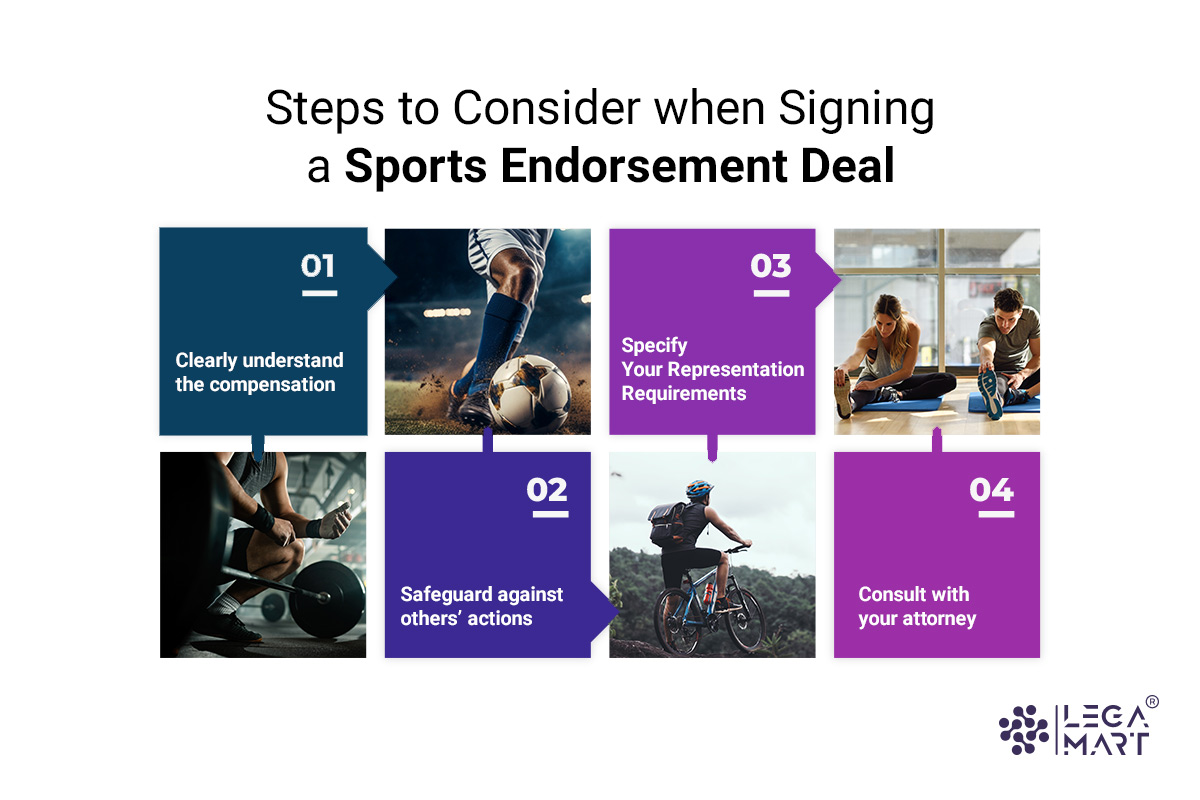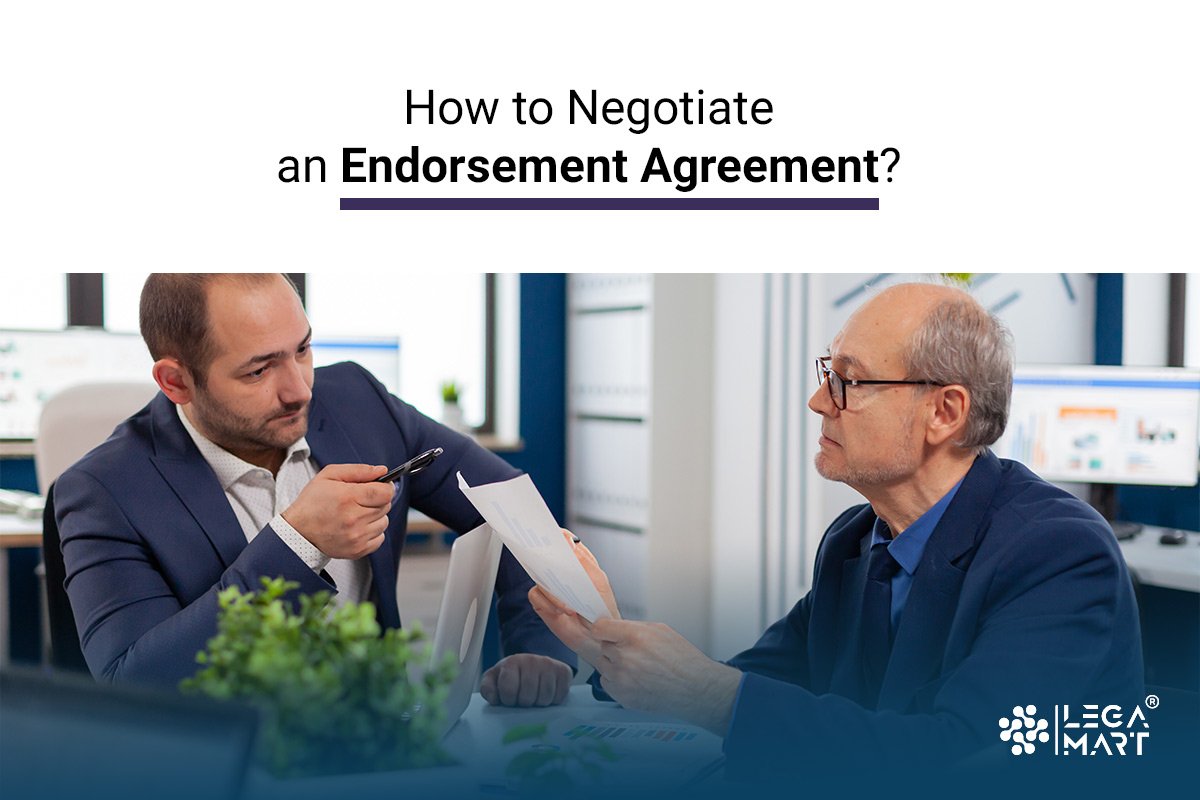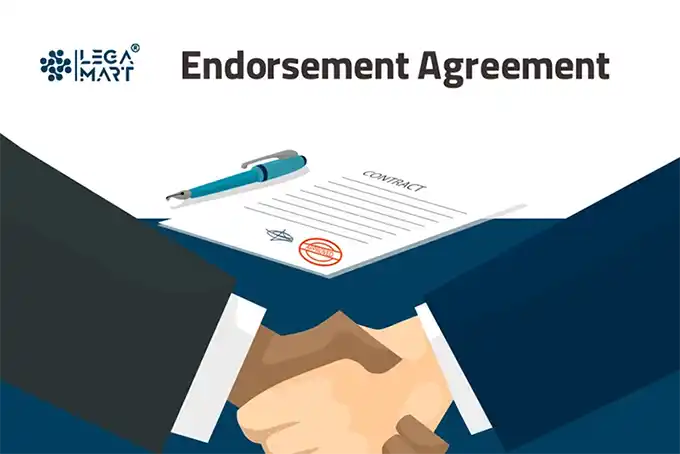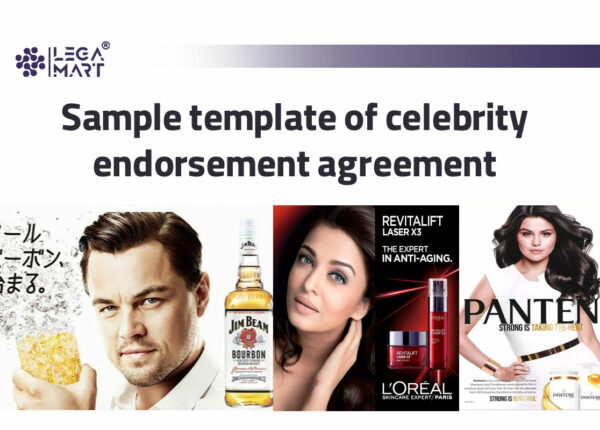Introduction
In 2003, David Beckham stepped onto the global stage again. But this time around, it was not just his football skills that captivated people’s attention; it was the ink on a groundbreaking contract that set the stage for an unprecedented partnership. In the realm of Legal Practice & Specialization, this endorsement deal stood out as a hallmark of strategic legal craftsmanship. David Beckham, the embodiment of style and talent, had secured an unbreakable bond with the iconic Adidas brand. With a flick of a pen and a cool 160 million dollar price tag, the endorsement agreement came to life.
Imagine a world where your favourite athletes, celebrities, and influencers become more than just familiar faces on your screens. Picture them as ambassadors of the brands and products they love, lending their credibility and influence to endorse and champion those offerings. Welcome to the captivating realm of endorsement agreements, where the power of a trusted personality can transform mere products into coveted must-haves.
An endorsement agreement is more than just a transaction between a brand and a famous figure. It is a strategic partnership meticulously crafted to leverage the unique charisma and influence of the endorser. Endorsement agreements hold immense potential, not only for the brands and the personalities involved but also for the consumers. We are no longer passive recipients of advertisements; we become part of a narrative, an intricate tapestry woven by our favourite personalities and the brands they believe in. These agreements can ignite our imaginations, inspire our aspirations, and even shape our purchasing decisions. So, let’s dive deeper into the realm of endorsement agreements.
Why do I need an Endorsement Agreement?
An endorsement is a powerful expression of support or approval for a specific product, brand, or service conveyed through social media platforms. Usually, celebrities or social media influencers with substantial followings, trust and recognition undertake these endorsements. They can take the form of posts, videos, Shorts on YouTube, Stories on Instagram, and more.
The true strength of endorsements lies in allowing brands to effortlessly connect with their target audience through a popular figure or personality whom the audience deeply trusts and admires. Consequently, this approach helps establish credibility and trust for the business among consumers. At the same time, it brings significant benefits to the endorsers themselves, as they often receive compensation, perks, and incentives for their support.
Endorsements leverage the fame, respect, and recognition of prominent individuals to serve as a form of promotion or advertisement. By enlisting these well-known figures, the primary objective of an Endorsement Agreement is to effectively promote a product or service in the industry or various other fields.
How do Endorsement Contracts work?

Endorsement agreements allow a company to utilise an individual’s name, likeness, and reputation to promote their products or services. Typically, the endorser is a well-known personality, often within a specific field or industry. The primary purpose of an endorsement agreement is to grant the sponsor the right to license and use the athlete’s name, image, or likeness in their advertising campaigns.
There are no strict guidelines or regulations regarding the structure of an endorsement agreement as long as it complies with the law. The terms and conditions of the contract can vary depending on the specific negotiations and obligations between the sponsor and the endorser. However, the amount of compensation offered to the endorser is often influenced by the sponsor’s belief in the endorser’s ability to enhance the sales and popularity of their product.
What are Celebrity Endorsements?
Celebrity endorsements serve as a powerful avenue for brand communication, employing a well-known personality to endorse and validate a brand’s assertions and standing. By leveraging their persona, popularity, social status, or field expertise, celebrities align themselves with the brand, effectively amplifying its reach and impact. The utilisation of celebrity endorsements has proven highly effective and remains a prevalent strategy for brand promotion.
Essentials of Celebrity Endorsements
When considering celebrity endorsements, brands should evaluate the following three key aspects:
- Attractiveness of the celebrity: An attractive endorser with intellectual capabilities or lifestyle tends to impact the endorsement positively.
- The credibility of the celebrity: The credibility of the celebrity greatly influences consumer acceptance, including the celebrity’s perceived expertise and trustworthiness.
- Compatibility: The compatibility between the brand and the celebrity is also vital for the success of their collaboration. These compatibility factors allow the brand to leverage the maximum benefit from celebrity endorsement.
What is an Endorsement Deal in Sports?
When a famous sports star is highly respected and seen as a positive example, brands believe being connected with that person will benefit their business. As a result, they are willing to pay the sports star to promote their products. This association is a valuable opportunity for the brand to grow and improve its reputation. For example, the endorsement between Steph Curry (one of the highest-paid athletes globally) and Golden State, where Steph Curry’s endorsement earnings reach an impressive $42 million for his annual contract with Golden State. This substantial endorsement revenue is derived from one of the largest shoe contracts ever signed. Consequently, Curry has become one of the most extensively endorsed athletes ever.
Steps to Consider when Signing a Sports Endorsement Deal

As a popular athlete, it is vital to take into account all elements encompassed within your endorsement contract, including; –
- Clearly understand the compensation: it is crucial to prioritise understanding the compensation structure of the endorsement deal to verify that you are being fairly remunerated for all aspects of the services you provide. This involves identifying all forms of compensation, such as fixed fees, royalties, free products, incentives, or any other opportunities provided.
- Review the morality clause: this clause is designed to prevent the company from being associated with what they consider “immoral behaviour”. When your image and reputation are utilised to promote your brand, engaging in activities that could potentially damage this image may result in a breach of contract.
- Specify Your Representation Requirements: it is crucial to be specific about your obligations under the contract. For example, if you are required to travel or make personal appearances, ensure that the same is well captured in the contract.
- Safeguard against others’ actions: Ensure that your endorsement contract includes an indemnification clause, which protects you from being held accountable for the actions or inactions of others. For example, if you endorsed a product based on the company’s representations, but they provided false information leading to a lawsuit, you should be protected.
- Consult with your attorney: as a popular athlete, you may receive endorsement offers from multiple companies. Therefore, it is vital to identify potential conflicts well in advance. For example, if an existing endorsement deal will continue after your new agreement takes effect, it is essential to disclose these arrangements to both the new and current sponsors, as your current endorsement agreement may prohibit you from entering into sponsorship agreements with direct competitors.
Who are the Parties involved in an Endorsement Agreement?
It is essential to ensure that all parties to an endorsement agreement are present and participate in the negotiations of the agreement. Each relevant party should have the authority to sign the agreement to make it legally binding; some of these parties may include;
- Endorsing company/entity: this refers to the company, individual or entity seeking the endorsement from the celebrity.
- The celebrity: this involves the specific celebrity who will be endorsing the endorsing company’s product, service, or brand.
- Management Company: a celebrity may act through a management company; if this is the case, this entity becomes the endorsing company’s counterparty for at least some “legal” components of the relationship. It is crucial to ensure that the management company has the authority to sign the endorsement agreement on behalf of the celebrity.
- Intellectual Property Rights holders: it is crucial to determine if any trademarks, copyrights, logos, or other intellectual property are associated with the celebrity. If the endorsing company intends to use or refer to these intellectual properties in the endorsement, identify the individuals or entities with the authority to allow their use.
How to Negotiate an Endorsement Agreement?

Negotiating an endorsement agreement requires meticulous planning and strategic considerations to create a mutually beneficial partnership between a company and a celebrity/influencer. Such agreements are essential in promoting products or services and leveraging a celebrity’s influence to enhance brand visibility. Crafting a successful endorsement deal entails addressing numerous crucial points, from defining the scope of the endorsement to negotiating compensation and duration.
In this endeavour, both parties must collaborate openly and transparently, seeking a win-win scenario that aligns with their respective objectives. By exploring each element in detail, from services required to confidentiality clauses and being flexible in finding creative solutions, a well-negotiated endorsement agreement can elevate the celebrity’s status and the company’s brand image in the competitive marketplace. Here is a list of key considerations when negotiating such agreements:
Identify the parties and their roles
It’s crucial to identify all parties involved in the endorsement agreement. Thus, parties need to have clarity on who should sign the endorsement agreement, as influencers/celebrities may have management companies acting on their behalf, making them the counterparty for certain legal aspects. Additionally, if the transaction entails using another person’s intellectual property, all associated parties should also be involved in signing the agreement.
Specify services and activities
Negotiating the promotional activities expected from the celebrity is crucial for a successful endorsement. This includes defining the number of appearances, the timing, and the locations where the celebrity will promote the product or service. Having detailed expectations helps both parties to avoid misunderstandings and ensures a clear understanding of each party’s responsibilities.
Define the endorsement scope
Parties must specify the brand intended for endorsement and define the territory in which the endorsement will apply. This step helps both parties understand the scope of the endorsement and what is expected from the celebrity. It should also address whether the endorsement covers only one specific project or extends to other future projects and regions.
Discuss compensation and payment terms
The negotiation of compensation is a critical aspect of the endorsement agreement. As such, both parties are expected to discuss the payment structure, including fixed fees and contingent compensation based on performance or sales.
Negotiate duration and flexibility
When it comes to the duration or term of the agreement, both parties may have different expectations hence the need for the same to be negotiated. For example, the company may want a longer-term agreement for continuity and brand association, while the influencer may prefer a shorter commitment for flexibility in future opportunities; if such differences are not negotiated well, it might cause ambiguity in the parties’ future engagements.
In view of this, parties must negotiate the terms to include in their endorsement agreement, such as possible extensions or termination, that allow for flexibility based on the changing needs of both parties.
Set exclusivity parameters
It is crucial for both parties to negotiate the level of exclusivity required in order to avoid conflicts of interest as well as protect their interests. Deciding on exclusivity in an endorsement agreement involves more than just preventing the celebrity from endorsing direct competitors. It may also include restrictions on engagements that could be considered incompatible, offensive, or controversial, as well as public activities associated with the company’s competitors.
The extent of exclusivity may vary based on compensation levels or continue even after the main agreement ends. To protect the company’s brand, it may be necessary to prohibit the celebrity from using previously endorsed slogans or themes in future promotion programs for other sponsors.
Negotiate on instances that may require early termination
Parties should negotiate on the conditions and equitable compensation in case of early termination to protect their interests in case the endorsement agreement needs to end prematurely. Ultimately, their negotiations should revolve around the course of action in the event that the endorser decides to drop the project, potentially involving equitable compensation for the influencer/celebrity before parting ways. Similarly, provisions must be negotiated for early termination if the relationship between the endorser and the celebrity isn’t meeting expectations, with considerations for notice periods and compensation.
Parties should also negotiate on specific conditions that allow them to terminate, such as offensive behaviour, criminal accusations, or failure to meet certain performance levels, with potential provisions for liquidated damages to protect both parties interests.
Anticipate unforeseen circumstances that may impact the endorsement
In a typical Endorsement Agreement, it is essential to include provisions that address potential unforeseen events affecting the celebrity’s ability to fulfil their obligations. Such clauses usually excuse the celebrity from their responsibilities during illness or physical incapacity. After recovering, the celebrity is expected to prioritise the endorser’s work per the agreement’s terms.
Additionally, it is crucial to incorporate a force majeure clause to account for events beyond the parties’ control, such as natural disasters. In these cases, both parties are typically relieved from their obligations under the agreement for the duration of the force majeure event. It may also grant the right to terminate the agreement if the force majeure event extends beyond a specified period mentioned in the agreement.
Discuss issues relating to the use of the influencer’s name/photograph
Negotiating the use of the influencer’s name and photographs in promotional materials is essential. Regarding using the celebrity’s name and photograph in promotional materials or any other project-related content, it’s essential to address this aspect during the negotiation of the endorsement agreement.
Parties should obtain pre-approval for specific uses or formats that may raise questions or concerns. For example, if the celebrity’s name is to be displayed prominently on billboards, seeking prior approval can help avoid future disputes.
Carefully assess the cool-off mechanism
The cool-off mechanism pertains to a specific period following the termination or expiration of the Endorsement Agreement, during which the endorser must remove all advertising materials featuring the celebrity. Typically, endorsement agreements include provisions that hold the endorser period has ended.
Considering the rapid and widespread distribution of advertisements, especially in digital media, companies should be mindful of setting a sufficiently long cool-off period. This allows them ample time to fulfil their obligations of removing the endorsed materials from circulation effectively. By doing so, they can mitigate the risk of breaching the agreement and ensure a seamless transition post-agreement.
Benefits of Endorsement Agreement
There are various advantages of executing an endorsement agreement:
Increase in brand recognition: Today, social media pages can generate hundreds of thousands of hits daily, especially if the account belongs to a celebrity. Therefore, endorsement done by a celebrity can bring the brand into the focus of millions of followers, which is further capable of becoming extremely lucrative for the company. There have been various studies in the past which have shown that people are more likely to focus on a brand which is promoted by their favourite celebrities. Therefore, using endorsement agreements can attract an entirely new target audience.
Builds brand personality and credibility: Through an endorsement agreement, it is not long before the attributes of a celebrity are affiliated with the brand they endorse. Take the example of bottled water, for instance. While bottled water might not be the ideal choice for everyone, when Smartwater decided to have Jennifer Aniston endorse their brand in 2010, it became the top-selling brand. Therefore, having a celebrity endorser ensures that the brand gets a trustworthy and high-quality image.
Boosts company profits: Having a good endorsement agreement with a celebrity can further boost the profits earned by the company. Take the example of Chanel. When Nicole Kidman signed an agreement with Chanel in 2003, the global sales of the brand had increased by a whopping 30%. Similarly, James Lee Curtis helped Activia become the best-selling yoghurt brand in the US. There are many such examples which highlight the importance of such agreements.
Cases on endorsement agreement
1. Amitabh Bachchan and Kamala Pasand controversy (2021)
In late 2021, the Indian actor Amitabh Bachchan decided to terminate his contract with Kamala Pasand, a pan masala brand, when the brand continued to air advertisements featuring Mr Bachchan despite the termination of the contract. Eventually, a legal notice was sent by the actor to the brand. The main reasons for termination were two-fold. Firstly, the national anti-tobacco organisation sent a letter to the actor asking him not to endorse the brand to stop youngsters from getting attracted to tobacco products. Secondly, while entering into the agreement, Mr Bachchan was said to be unaware of it being surrogate advertising, i.e., substitute advertising for goods which cannot be directly advertised due to some prohibition of the law. Eventually, the brand agreed to pull down all advertisements of the actor.
A similar incident occurred in 2018 when Pierce Brosnan was sent a legal notice by the Delhi Government for appearing in a surrogate advertisement for a pan masala brand. The actor had claimed that he was unaware of the hazardous nature of the products, and eventually, the brand had to pull down all advertisements featuring the actor.
2. Charlize Theron was sued by a Swiss watchmaker (2008)
In 2008, Charlize Theron (A South African and American actress) was sued for $20 million by a Swiss watchmaker Weil. The actress had entered into an endorsement deal with the brand, according to which, from October 2005 to December 2006, the actress was supposed to wear only Weil’s high-end watches. However, the brand later claimed that the actress had breached her contract with the company since she was photographed wearing a Christian Dior watch on 14th March 2006. Further, the agreement was said to also prohibit the actress from advertising any jewellery, even if it is for charity, against which she was photographed wearing a necklace used for benefiting AIDS charity.
While the matter was eventually settled between the parties within 30 days of filing the suit, the lawsuit highlighted the extreme effects of such endorsement agreements, especially if the terms were not adequately met. It, therefore, becomes important to negotiate the terms of your agreement to avoid the occurrence of similar situations in the future.
3. Kardashians sued by a credit card company (2011)
In January 2011, Revenue Resource Group, which was the owner of Mobile Resource Card, had sued the Kardashian sisters, their money, along with their Dash Dolls Company for allegedly walking away from an endorsement deal for the promotion of a branded prepaid debit card, also known as the “Kardashian Kard”. It was alleged that the stars had agreed to speak nice things about the card in the press and on their social networks in exchange for some fee along with a percentage of revenue depending upon the persons who signed up for it. However, when the card was criticised for its high prices, they unilaterally terminated the agreement and made disparaging comments about the card. This resulted in the collapse of the company business, and hence, the company sued them for $75 million in damages.
However, the Kardashians had brought in an anti-SLAPP motion, a common tactic used in California to escape lawsuits due to people speaking their minds on public import issues. It was eventually held that it was not the Kardashians and the termination of the agreement which resulted in the failure of the company, but rather it was their publicity which had killed their business since the product’s features were not per the public preferences.
Eventually, the anti-SLAPP motion was granted, along with Kardashians getting $6,825 as attorney fees.
Sample Template of Celebrity Endorsement Agreement
THIS ENDORSEMENT AGREEMENT (“Agreement”) by and between ___________ (“A”) and ______________, a Massachusetts savings bank with its principal place of business at 24 North Street, Pittsfield, MA 01210 (“B”)(Each or both of which shall hereinafter be referred to as the “PARTY” or “PARTIES,” respectively).
1. Endrosments and Grants of Rights
During the Contract Period:
a) A will make the appearances and provide to B during the Services Period the services, initiatives and programs described in Schedule A attached hereto (the “Endorsement Services”); and
b) A grants to B the exclusive right and license (the “License Rights”) to use the A Identification during the Contract Period and throughout the Contract Territory solely in connection with the advertisement and promotion of B and the Financial Services;
c) The License Rights are exclusive to B and may not be assigned or in any way conveyed by B without A’s express written consent, except in the event of a merger by B with another entity offering Banking Services.
2. Exclusivity
A expressly agrees and undertakes that:
a) The right to use the A Identification has not been previously granted, nor will it be granted to anyone other than B for use during the Contract Period within the Contract Territory in connection with the advertisement, promotion and sale of products and services which are the same as or similar to any of the Financial Services;
b) A will not enter into any arrangement or agreement which enables any B Competitor to be endorsed by A (whether by using the A Identification, A providing services similar to the Endorsement Services, or otherwise) during the Contract Period within the Contract Territory. Notwithstanding the foregoing, it is understood that A has no control or influence over any decisions by the University of Connecticut to enter into any arrangement or agreement with any B Competitor.
c) Anything herein to the contrary notwithstanding, B shall not have the right to utilise the A Identification except to the extent specifically authorised by this agreement.
d) Nothing herein shall grant A any rights to use any of B’s trademarks, names, service marks, logos or any copyrightable materials with B’s prior written consent.
3. Compensation
(a) In consideration of the rights and benefits granted to B hereunder, B shall pay to A the sum of Four Hundred Eighty Thousand and 00/100 Dollars ($480,000.00), as set forth in Paragraph 4 (b)-(c) below.
(b) B will make four (4) equal cash payments to A in the amount of Ninety Thousand and 00/100 Dollars ($90,000.00) on 1st June 2012, 1st June 2013, 1st June 2014, and 1st June 2015.
(c) B will cause to be issued to A on 1st June 2012, 1st June 2013, 1st June 2014, and 1st June 2015 (each an “issuance date”) four (4) blocks of shares of unrestricted common stock of B’s parent corporation, B Hills Bancorp, Inc. (BHLB), each of which as of its respective issuance date shall have a value of Thirty Thousand and 00/100 Dollars ($30,000.00), based upon the closing price of BHLB common shares at the end of the last trading day immediately preceding the issuance date.
4. Payments
A may elect to have cash payments due A hereunder made by check, wire transfer, or bank transfer. Unless such election is made in writing, all cash payments shall be made by check, drawn to the order of A or its designated entity or entities and delivered to the address first stated above. Past due cash payments (i.e., payments due more than thirty (30) days after B’s receipt of the applicable invoice) shall bear interest at the rate of one (1%) per cent per month.
5. Endrosments services and appeareances
(a) B acknowledges that A’s primary obligations are those associated with his position as the head coach of the University of Connecticut women’s basketball team. Further, B acknowledges that A has certain obligations related to his position as the head coach for the United States Women’s Olympic basketball team. Subject to A’s obligations as the head coach for the University of Connecticut women’s basketball team, the United States Women’s Olympic basketball team, A shall make himself available for those appearances set forth on Schedule A.
(b) B shall reimburse A for all reasonable out-of-pocket expenses incurred by A in attending any requested appearances, including any travel days. Without limitation to the foregoing, B will reimburse A for his air travel expenses if necessary for A to be in attendance at a requested appearance. In addition, if necessary, A shall be provided with superior hotel suite accommodations and reimbursed for all reasonable dining expenses incurred while travelling to and attending any appearances or events.
(c) B shall give A as much advanced notice as possible for any requested appearances, but in no event shall B give A less than fifteen (15) days notice of the time and place B desires A to appear.
(d) Unless otherwise agreed to in advance, no appearance shall exceed a total of two (2) hours in duration.
(e) Any apparel that A is requested by B to wear during any appearance or any photo shoot session must be approved by A at least forty-eight (48) hours in advance and must be Nike-branded apparel.
6. Termination
(a) Either Party shall have the right, without prejudice to any other rights it may have, to terminate this agreement if the other party materially breaches its obligation hereunder and such breach remains uncured.
(b) A material breach occurs if either party (i) fails to make any payment or (ii) fails to observe or perform any of the covenants, agreements, or obligations (other than payments of money).
(c) Upon the expiration or termination of this agreement for any reason
(i) all payments that have accrued prior to the termination or expiration of this agreement will be payable in full within thirty (30) days thereof, but any obligations to make further payments due, or that may have come due, under this agreement shall become null and void;
(ii) except as otherwise provided herein, the Services Period and the Contract Period shall end immediately and B shall promptly cease all use of the A Identification including any displays, documents, artwork, symbols, logos trademarks, trade names, photographic or graphic representations, depictions and/or other materials (including, but not limited to, advertising and/or promotional materials), which in any way or form (hard copy, electronic or otherwise) use the A Identification (collectively, “Materials”), except as otherwise set forth herein; and
(iii) except as otherwise provided herein, B shall promptly remove all links and references to A and Materials from its website. Notwithstanding the foregoing, if the agreement is terminated for any reason other than B’s material breach, then for thirty (30) days following such termination, B may continue to use any printed material already produced under this agreement. At the conclusion of this period, B’s use of the printed material will cease.
Follow this by including other miscellaneous provisions such as force majeure, notice, governing law, dispute resolution, etc., similar to other agreements, you can find various legamart blogs on the same.
Conclusion
Indeed, the usage of endorsement agreements is undoubtedly capable of providing many advantages to the business, which further helps the advertisement of your products become appealing and more visible to the general public. However, ensure that you have properly negotiated the terms within the agreement and that there remains no ambiguity in the language of your agreement. If you want to execute an endorsement agreement or want to get your endorsement agreement reviewed by understanding the laws specific to your jurisdiction, LegaMart‘s excellent team of lawyers are always available for your service. Reach out to them today!
Frequently Asked Questions
1. Can student-athletes do endorsements in the US?
Yes. Since 1st July 2021, under the NCAA (National Collegiate Athletic Association) Rules, student-athletes are now allowed to do endorsements in the US. This means they can sign endorsement deals, monetise their social media presence, complete other commercial activities, etc.
2. When can an endorser be held liable for an endorsement?
In certain situations, it is possible for the person making the endorsement to also be held liable. If endorsements consist of misrepresentations, are related to health and safety, if the endorser has not unveiled material connections with the product or company, or if the endorsement consists of some defamatory remarks, it is possible for the endorser also to bear liability.





